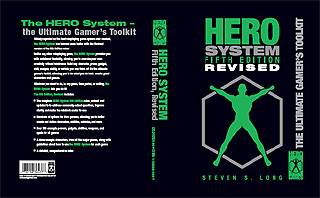Hero RPG
designed by Steven S. Long
2005, Hero Games, Inc.


Widely regarded as the best role-playing game ever designed, the heart of the Hero system is the way it allows the players to design "powers". The game was originally for playing superheros from comic books, so it had to be flexible enough to handle almost any superpower one could imagine. Later it proved to be incredibly easy to use the same system to simulate magic spells and enchanted items from fantasy RPGs or laser pistols and high-tech equipment from science fiction RPGs, or anything in between.
The key insight that allows the system to work is to focus on effects, not causes. When constructing one's power out of the Hero RPG's building blocks, there is no "flamethrower" power, or "machine gun", or "disintegrator ray", or "cold beam", or "japanese throwing star" powers. There is a generic "energy beam" power who's effect is "to cause damage at a distance". The generic power is customized with various advantages (which make the power more powerful), disadvantages (which make the power weaker in some specific respect) and "special effects" (which sometimes influences the effect it has on other character's powers, or the effect other powers have on this one).
For instance, a hero with a pure "energy beam" power just points their finger and cause damage to their opponent. Add the "focus" and "charges" limitations and it becomes a handgun, an automatic weapon with the addition of the "autofire" advantage. Add "focus" and "re-usable charges", and it becomes arrows or throwing daggers. Use the "area effect", "continuing charges", "uncontrolled", and "sticky" advantages with the "fire" special effect, and it is a flame-thrower.
As a bonus clever bit, this power construction system also incorporates a calculation of the power's "cost" in character generation points. Two powers with the same amount of points give approximately the same advantage. This can be used to balance characters, and to limit the number of initial powers a character has.
As proof that the system is well thought out, sometimes a given superhero superpower can be generated in two different ways, starting with different base powers. When this is done, more often than not both ways wind up costing the same amount of points.
More importantly, even if one's players are not allowed to make their own powers, the power system gives the game master a surprisingly effective "game toolkit" allowing them to, say, translate their favorite TV show into Hero game terms. It is easy to make a Star Trek phaser (with all the settings), a Tricorder, a sonic screwdriver, or a Stargate. Not to mention a wand of fireballs, a scroll of vanishing, or a chromatic dragon.